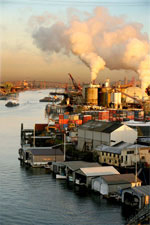A version of this story was originally published in the Spring 2013 UW SRP eBulletin.
 Region 10 EPA says it in their publications: “Your comments on the proposed plan are important. Your comments may make a difference.” The Duwamish River Cleanup Coalition Technical Advisory Group says it to newscasters, in editorials and at public meetings: “Public comments regarding EPA’s proposed plans have changed the plan and improved cleanup.” The word is out and it’s written in the multiple languages spoken in the area: “There are 20 Days left to make a difference, the public comment period closes on June 13th!”
Region 10 EPA says it in their publications: “Your comments on the proposed plan are important. Your comments may make a difference.” The Duwamish River Cleanup Coalition Technical Advisory Group says it to newscasters, in editorials and at public meetings: “Public comments regarding EPA’s proposed plans have changed the plan and improved cleanup.” The word is out and it’s written in the multiple languages spoken in the area: “There are 20 Days left to make a difference, the public comment period closes on June 13th!”
The Duwamish River Cleanup Coalition Technical Advisory Group (DRCC/TAG) is EPA’s recognized community advisory group for the Lower Duwamish Waterway Superfund site. Their mission is to ensure a Duwamish River cleanup that is acceptable and beneficial to the community and is protective of fish, wildlife and human health. The Coalition seeks a cleanup that: a) offers the most certainty- a strong cleanup plan, where pollution sources are controlled and toxicants are removed; b) ensures a permanent solution; and c) creates health equity- addresses the harmful health impacts for those who are most vulnerable to exposures.
The DRCC/TAG would like the EPA’s final plan to encompass the removal of all of the ‘highly and moderately toxic’ sediments and to increase the ‘enhanced recovery treatment’ area to include all ‘low-level’ toxic sediment. The EPA plan leaves much of the area to ‘natural recovery’ that involves river sedimentation processes alone. The DRCC/TAG also seeks a cleanup that stops recontamination by upstream sources. Practically speaking, this effort must be clearly identified through goals with enforceable actions that will penalize those responsible for contamination from upstream.
The DRCC/TAG strongly supports hiring ‘locally’ during the cleanup and advocates for posting fishing ‘alternatives’ rather than continuing a less effective posting of fishing ‘advisories.’ They would also like to see the creation of a fund to help those who are most heavily impacted by health hazard related to exposures.
Play a role in guiding the cleanup of Seattle’s River! Check these sites for information and opportunities:
- View a five-minute presentation on DRCC/TAG recommendations that improve upon the EPA plan.
- May 23rd learn about the river and cleanup, join the interactive art event. Experience the River in 3-D
- May 29th participate in the final EPA Public Informational Meetings at Seattle’s Town Hall
(photo credit: Paul Joseph Brown, Seattle Post-Intelligencer)

